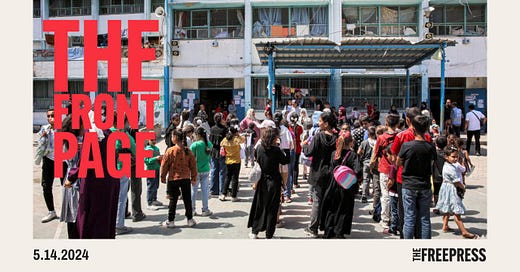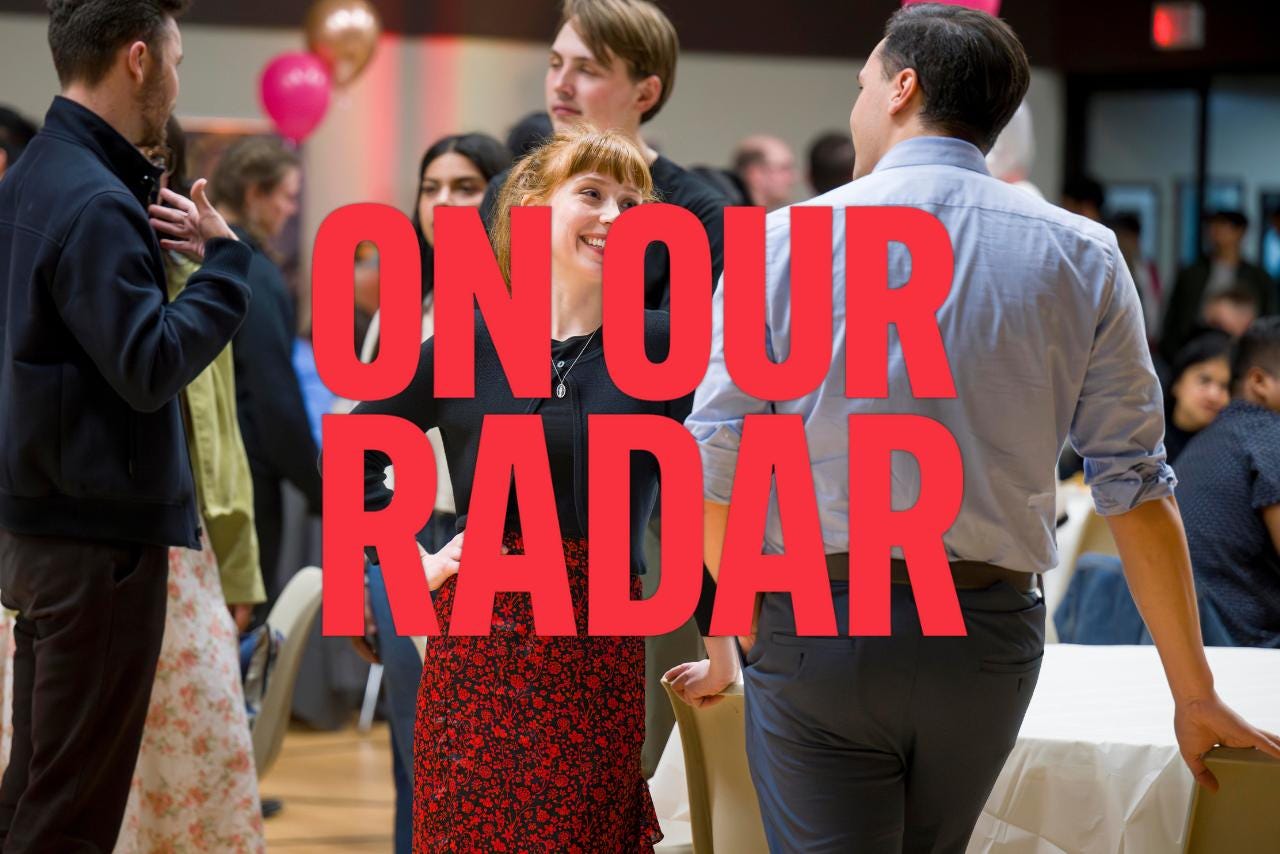
The Free Press

On today’s Front Page from The Free Press: the commencement speech the class of 2024 needs to hear, our coming dating dystopia, and much more. But first, Free Press senior editor Peter Savodnik on a major story that has gone curiously overlooked.
The UN admits the number of civilian deaths in Gaza is 50 percent lower than first reported. Why is everyone ignoring this fact?
Millions have marched across the world demanding Israel end its “genocide” in Gaza, pointing to the number of civilians killed by the war. But the United Nations now concedes that this number—provided by Hamas—is wildly inaccurate.
In a May 6 report, the UN stated the death toll was 34,735, including 9,500 women and 14,500 children, or at least 24,000 civilians.
But two days later, the UN quietly revised its figures, stating that 50 percent fewer civilians had died. The total number of deaths is about the same at 34,844, but that number includes 4,959 women and 7,797 children—a total of 12,756 civilians. (And this from the United Nations, whose General Assembly adopted 15 resolutions on Israel in 2023, compared to seven for the rest of the world combined.)
This revision is the clearest sign yet that Hamas’s statistics cannot be trusted. As David Adesnik, senior fellow at the Foundation for the Defense of Democracies, says: “The UN should state clearly that it has lost confidence in sources whose credibility it has affirmed for months.”
While any number of civilian deaths is tragic, “you want to be truthful,” said John Spencer, West Point’s urban warfare expert, who was in Gaza earlier this year. “Truth still does have a place in our media.”
Spencer says that even the revised UN figures probably overstate the death toll, because the numbers aren’t limited to people who were killed in the war. “The UN numbers include every death in Palestine no matter what the cause was,” Spencer told The Free Press. “Every natural death, missing person, anyone killed by Hamas.”
And yet, so far not a single major media platform, save Fox News, has reported on the new UN numbers. (MSNBC’s Joe Scarborough tweeted about them.) On Monday, the Israel advocacy group HonestReporting noted as much, adding that the old casualty figures “continued to be parroted by various media outlets.”
Meanwhile, Spencer said it’s impossible to gather accurate statistics in a time of war. He noted that we still don’t know how many civilians died in the 2016 Battle of Mosul, in which Iraqi Special Forces retook the city from the Islamic State. “It’s been maddening from my angle that anyone could think there could be a number for the dead in a war anytime in human history down to a single digit on a daily basis—it fails common sense—and be run by mass media of the world as fact.”
Read Peter Savodnik’s piece “What Makes a War Just?” and follow him on X @petersavodnik.
And for more from John Spencer on the reality of war in Gaza, listen to his excellent recent appearance on Sam Harris’s podcast, Making Sense.
For those lucky graduates who actually get to go to commencement this year, we can be fairly sure of one thing: unless David Foster Wallace comes back from the grave for a redo of his classic 2005 Kenyon commencement address, the speeches will be instantly forgettable.
Not so for this piece from University of Virginia professor Robert Parham. Read it. Then print it and read it with your kids. Trust us. Here’s a taste:
Whenever I speak with my students—I teach at the University of Virginia—they seem deeply pessimistic about the state of the world. We all know the reasons. Climate change is going to kill us all; late-stage capitalism is running amok; inequality is at an all-time high; racism and bigotry are rampant; gender-nonconforming and queer people are under unprecedented attack; economic anxiety has never been worse; AI is coming for our jobs; and on and on and on.
I then pose a simple thought experiment to them: If you were given a time machine that could take you back to any period in the last 12,000 years—since the dawn of civilization—when would you rather live?
You see, I believe we currently live in the golden age of humanity. Things have never been better for human beings. Yet it seems we have never felt worse about our prospects.
If you’re a woman, go back more than about 100 years and you become property (of your father and, later, your husband), with no voting rights and little protection under the law. If you’re a person with above-average melanin levels, like me, the same (and worse) happens to you. Gender-nonconforming minorities would find the past just as terrible.
Based on every objective measure of well-being—safety, health, wealth—if you are a college student in America today you are better off and wealthier than the king of England was 300 years ago.
Joe Biden trails Donald Trump in five of six swing states, according to a new survey published yesterday. There are bad polls and there are bad polls. And this one is the latter for the president. In Georgia, which Biden won in 2020, he trails by ten points. (NYT)
Putin has reshuffled his war machine, promoting technocrats and replacing his long-standing defense minister with an economist. But don’t take this as a sign that Putin is preparing for peace, argues Russia watcher Mark Galeotti. (The Spectator)
Last week a Google spreadsheet called “Is your favorite author a Zionist?” went viral. Jesse Singal calls the list “deeply sad and extremely late-internet.” We say: if you’re drawing up lists of Jews, maybe consider that along the way, something, somewhere has gone terribly wrong. (Singal-Minded)
J.D. Vance attended Trump’s trial yesterday and posted his observations on X. Tim Scott could be next. Is a show of courtroom solidarity and live-tweeting the indictment the new VP loyalty test? (Semafor)
In “that backfired” news, UNC–Chapel Hill’s board of trustees has voted unanimously to divert $2.3 million away from DEI initiatives and into public safety measures. Board members cited anti-Israel protests on campus as part of the reason for the need to reallocate the funding. (WUNC)
Princeton students have ended their anti-Israel hunger strike due to “health consequences.” We wish them a happy late dinner. (The Daily Princetonian)
A new study has found that patients of newly trained doctors tend to have higher survival rates if the doctor scored highly on board certification exams. Tests, it turns out, might not be racist, but actually quite good predictors of competence. (Harvard Medical School)
America is in the midst of a start-up boom. Last year a record 5.5 million applications to form businesses were filed. (The Economist)
It’s been nearly four years since a group of mostly liberal, center-left writers stuck up for the idea of free expression in a letter to Harper’s Magazine. In that time, critics used the phrase “Harper’s Letter crowd” to imply a tight-knit group of co-conspirators. That’s not the case, says Free Press contributor and signatory to the letter Kat Rosenfield: “No one is more disappointed than me that I have not been summering at one of J.K. Rowling’s castles all this time.” (The Usual Palm Tree)
In an ominous development, Taylor Swift has applied to trademark the phrase “Female Rage: The Musical.” Whether tortured poet or tortured playwright, this tortured woman is not done torturing. (WhatsOnStage)
→ The singularity for singletons: Last week, Bumble founder Whitney Wolfe Herd made a prediction about the future of dating: “There is a world where your AI dating concierge could go and date for you with another dating concierge. . . and it will scan all of San Francisco for you and say, ‘These are the three people you really ought to meet.’ ”
In other words, no more flirting. No seducing. No more risks. No more revelations or surprises. You get all of that information in advance from your “AI concierge.”
And here I was thinking getting to know someone was the fun part.
Wolfe Herd suggests your AI avatar will scan your city to identify suitable partners that you would like. What it would also do, though, is scan other avatars to identify who would like you. In other words, you no longer have to try so hard to be a socially attractive person. The AI will let you “be yourself” and you can passively watch the messages roll in.
What this all offers is freedom from vulnerability, from judgment, from being found inadequate. And then, if the date goes south, you can tell yourself it’s the AI’s fault, not yours.
More than 50 years ago, the sociologists Jonathan Cobb and Richard Sennett wrote, “Whom shall I marry? The more researchers probe that choice, however, the more they find a secret question, more destructive, more insistent, that is asked as well: Am I the kind of person worth loving? The secret question is really about a person’s dignity in the eyes of others.”
The Bumble founder is selling the fantasy that you can enjoy the company of others without effort. Yes, dating can be tedious. Sometimes you have to crush a lot of rocks to find a gem. But outsourcing real-world interaction to AI will diminish you. You will learn less about yourself, your likes and dislikes. It will make you a less interesting person, and, ultimately, a less desirable partner. —Rob Henderson
→ The internet is good, actually: And now, from a gloomy tech-enabled dating dystopia to something less doomer. A huge new global study finds that internet use has boosted well-being. The study, published this week, looked at the well-being of 2.4 million people over a 16-year period and, per Nature, “found that, on average, people who had access to the internet scored 8 percent higher on measures of life satisfaction, positive experiences, and contentment with their social life, compared with people who lacked web access.”
But perhaps unsurprisingly, there’s more to the story than “internet = happiness.” The study also found that women aged 15 to 24 who said they had used the internet in the past week were “less happy with the place they live, compared with people who didn’t use the web.” One of the study’s authors told Nature that more studies were needed to establish whether there is an actual causal link between internet use and well-being.
Me? I’m just searching for the sweet spot where I get all the connectivity of the web without social media dopamine hits rewiring my brain. In other words: we peaked with the Blackberry. Let’s bring it back.
Helen recommends Culver’s, the Midwestern chain that she calls “the best fast food in America”: If you have not tried their fresh ground beef hamburgers or the Walleye fish sandwich, you just do not know what good is.
Sarah recommends you eat Mexican food in the Capital Region: Albany: it’s two and a half hours from anywhere you actually want to go! While you’re there, check out Taqueria Tren Maya, in a strip mall on Green Island. Their handwritten menu features: “Trump Favorite Taco: crunchy beef o chicken.”
Readers, keep the recommendations coming to thefrontpage@thefp.com. Tell us your favorite food joints (fast or slow), local stores, Etsy vendors, or whatever else.
Oliver Wiseman is a writer and editor for The Free Press. Follow him on X @ollywiseman.
To support The Free Press, become a paid subscriber today:
And if you’re enjoying The Front Page, consider forwarding it to someone else you think might like it.









“A new study has found that patients of newly trained doctors tend to have higher survival rates if the doctor scored highly on board certification exams. Tests, it turns out, might not be racist, but actually quite good predictors of competence. (Harvard Medical School)” So relived. For the last couple of years I’ve been worried that I’m wrong for wanting really smart people giving me health care.
So Israel actually killed a few more people than Hamas reported, but fewer of them were civilians. But still many thousands of civilians have been killed, including many women and children. When the number was 10,000, it was too damn many. When it was 20,000, it was too damn many. And you want what, a rousing cheer because fewer of the nearly 40,000 deaths were civilians? That’s some sick bullshit.
“We only murdered half the civilians they claimed!” will not go down in history as a great cry of victory.